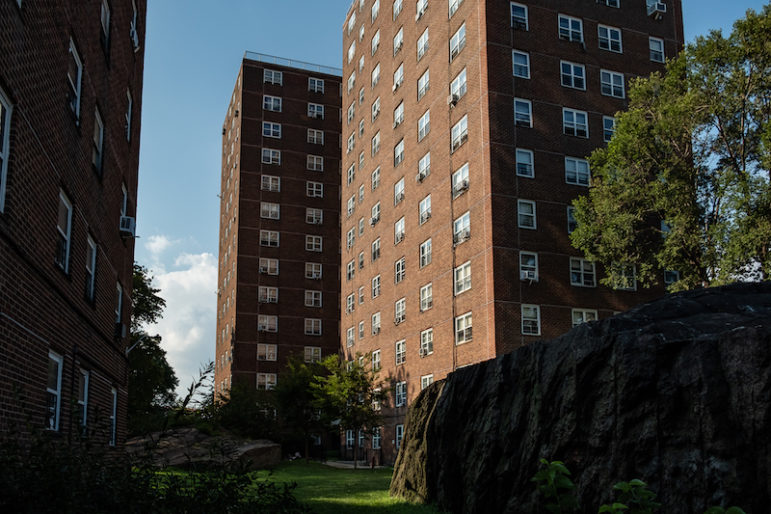The arrest Tuesday of 70 NYCHA employees who allegedly pocketed bribes for steering small-dollar contracts is prompting calls to reform how the housing authority handles such work—what Congressman and former City Council public housing chair Ritchie Torres called ‘a breeding ground for corruption and influence peddling.’

Adi Talwar
NYCHA’s Gun Hill Houses in the Bronx is among dozens of public housing developments across the city where staff allegedly took bribes in exchange for doling out work contracts.In March of 2019, then-City Councilmember and public housing committee chair Ritchie Torres quizzed NYCHA officials at a public hearing about the housing authority’s process for awarding so-called “no-bid” contracts.
When a NYCHA development needs repair work that costs below a certain threshold—$5,000 at the time, and $10,000 currently—it isn’t required to undergo the usual procurement process, in which multiple vendors submit bids for the authority to choose from. Instead, designated NYCHA staff can approve a contractor of their choice, a quicker process for a public housing system with billions of dollars in repair needs.
But that flexibility also makes it rife for abuse, Torres noted in 2019. “Since there’s no bidding and since there’s minimal review, a manager or superintendent could carefully structure these …in the hopes of steering these bids toward preferred vendors, toward friends,” the lawmaker said at the time, according to a transcript of the hearing.
Nearly five years later, that’s exactly what happened, federal prosecutors charged Tuesday—in what officials called “the largest single-day bribery takedown in the history of the Justice Department.”
The scandal, in which 70 current and former NYCHA superintendents and staff are accused of allegedly pocketing bribes in exchange for granting no-bid or “micro contract” repair work, has renewed calls for the housing authority to reform its procurement processes.
“The deregulated world of micro contracting is a breeding ground for corruption and influence peddling,” Torres, now a congressman representing New York’s 15th District in the House of Representatives, said in a statement Tuesday. “NYCHA’s process for administering micro contracts needs to be fundamentally rethought.”
The city’s Department of Investigation (DOI) has issued more than a dozen recommendations for NYCHA in response to the mass arrests, in which dozens of public housing employees at developments in every borough allegedly netted a collective $2 million in bribes by steering more than $13 million in contracts.

U.S. Southern District of New York
The DOI’s reforms, which the department said NYCHA has agreed to implement, include mandatory trainings for both vendors and public housing employees, requiring regular reviews and audits of micro contracts from departments outside the developments where work is being done, and increased signage and messaging that warns workers that bribery is a criminal offense.
DOI also calls for NYCHA to build out a list of pre-qualified companies for small dollar contracts that will undergo a “vendor integrity review.”
Three of the recommended reforms, DOI noted in a press release, are similar to measures the department issued to NYCHA in 2021 but which the housing authority “ultimately rejected.”
They include shifting responsibility for approving micro purchases to NYCHA’s centralized staff, instead of building superintendents and other employees based within housing developments, as well as identifying cost estimates for the most common types of no-bid repair jobs—making it easier to spot anomalies in pricing. Vendors seeking more than the standard compensation will be required to provide “a written explanation for the additional cost.”
NYCHA staff outside the developments where work is being done should review all micro-purchases regardless of their price tag, the DOI says.
The no-bid procurement process, “was intended to ensure swift completion of necessary lower- cost construction and maintenance work in the NYCHA developments,” DOI Commissioner Jocelyn E. Strauber said in a statement Tuesday. “The conduct, as alleged, drove up the cost of this kind of work and diverted valuable public funds away from public housing and into the pockets of corrupt NYCHA staff.”
NYCHA, the largest public housing system in the country, is in need of an estimated $78 billion in repairs over the next two decades. Tenants regularly deal with issues like mold, heat outages and malfunctioning elevators, and have complained that repairs are often done shoddily or not done at all. NYCHA had more than 581,000 open work orders in December; the authority’s “manageable workload” is 90,000.
“NYCHA residents face a variety of ongoing management issues, from outstanding repairs to heat outages and other quality-of-life issues,” City Councilmember Chris Banks, who now heads the City Council’s public housing committee, said in a statement. “They rely on management to create a liveable environment and make investments in their properties, not to take personal kickbacks.”
Beyond NYCHA, Rep. Torres on Wednesday introduced a bill that would require public housing authorities across the country to make all of their contracts publicly viewable, the Daily News first reported.
The DOI is already required to publish annual reports of NYCHA’s small procurement contracts, the result of a bill sponsored by Torres and passed by the Council in 2019. An investigation that year by news site The City found NYCHA staffers had given out more than $250 million in no-bid contracts since 2014.
In a statement Tuesday, NYCHA CEO Lisa Bova-Hiatt said the housing authority “has ZERO tolerance for wrongful and illegal activity.”
“We will not allow bad actors to disrupt or undermine our achievements,” she said. “We will continue to work with all of our law enforcement partners to rid the Authority of malfeasance.”
With additional reporting by Tatyana Turner.
To reach the reporter behind this story, contact Jeanmarie@citylimits.org.








